Classic Movie Review: 'Mo Better Blues' is Spike Lee's Least Loved Classic
I have grown into loving 'Mo Better Blues' and I am better for it.
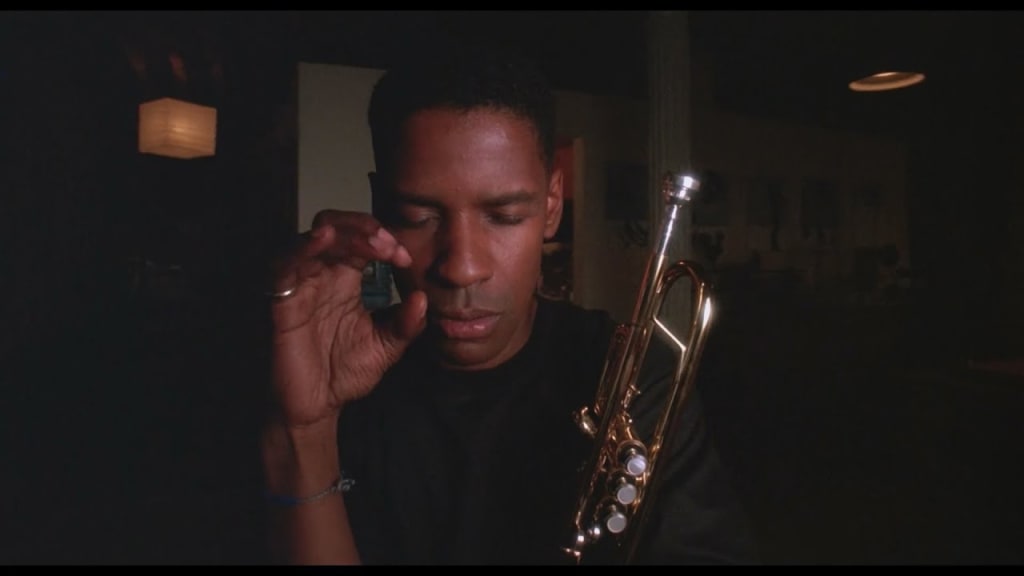
Mo Better Blues is not one of Spike Lee’s most well remembered movies. The follow up to his inflammatory masterpiece, Do the Right Thing, Mo Better Blues is a complete change of pace. The film owes far more to Spike’s She’s Gotta Have It than Do the Right Thing. Mo Better Blues is a character piece, rather plot-less, but with an undeniable personality, life, and energy.
Mo Better Blues stars Denzel Washington as Bleek Gilliam, the head of Bleek Gilliam Quintet. Bleek is a blues musician who is juggling two women. One of the women is Indigo (Joie Lee), a High School teacher, stable, levelheaded and loving. The other is Clarke (Cynda Williams), a sultry, sexy, woman who may or may not be seeking to use Bleek to start her music career. It would not be unfair to say Bleek has a more prurient interest in Clarke.
It would also be fair to say that Bleek fears what he sees in Indigo. Why? Because, in Indigo he can see a future. He sees a wife and mother to his children and that kind of commitment, the kind of dedication that it would take to love and appreciate a woman like Indigo, is not something Bleek is capable of at this point in his life. For now, Bleek is obsessed with his muse, the blues, and being with his boys in the band.
The early portions of Mo Better Blues rely on and thrive in the time spent backstage at the club where Bleek and his band are the house band, on stage every night in front of sold out crowds. If only they were compensated fully for that full house. Unfortunately, Bleek has left it up to his old friend Giant (Spike Lee), to negotiate his contract with greedy club owners Josh and Moe Flatbush (Nicholas and John Turturro).
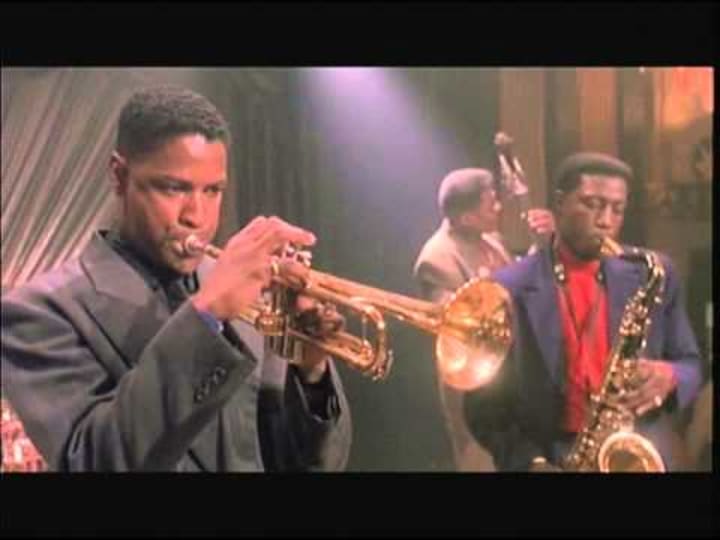
Giant has not done well with these negotiations and it has caused a rift in the band, especially with Shadow (Wesley Snipes), Bleek’s friend and rival. Shadow is the one player who can truly match Bleek in talent and he knows it. Wesley Snipes is incredibly good at playing arrogant men who can back up their arrogance with an equal amount of talent. Shadow is scheming to make his own band behind Bleek’s back and has his eyes on Clarke as well.
So what’s at stake here? Is Shadow the antagonist or are the Flatbush Brothers? What is the plot of Mo Better Blues? I can honestly say I don’t think there is much of a plot. Shadow is a great character, wonderfully played by Snipes and Spike ends up giving the character a good deal more dimension by the end of the movie. Shadow and Bleek have their differences but Shadow also comes through for Bleek by the end and demonstrates growth.
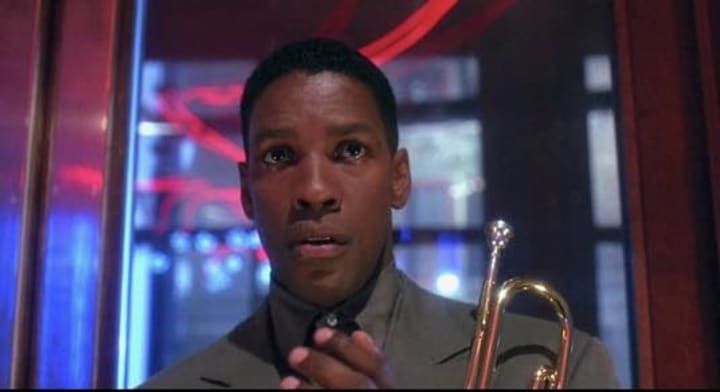
The Flatbush Brothers are a good deal more troublesome. Spike Lee came under fire back in 1990 for what many considered old Jewish stereotypes of the greedy, conniving, Jewish business owner, that miserly keeps their riches away from their deserving employees. Is the criticism fair? It’s hard to say. The Flatbush Brothers are never played as outwardly Jewish, there are no visual signifiers. But, there is no denying that they are greedy and conniving and I can certainly see where Jewish people would recognize something insidious about them.
I never appreciated Mo Better Blues when I was younger. It took growing older and being inundated with so many factory produced action movies, formula comedies, and cliched Hollywood horror movies for me to appreciate something as offbeat and plotless as Mo Better Blues. I love the looseness and the stylishness of Mo Better Blues today, if only because it is so delightfully different from other movies.
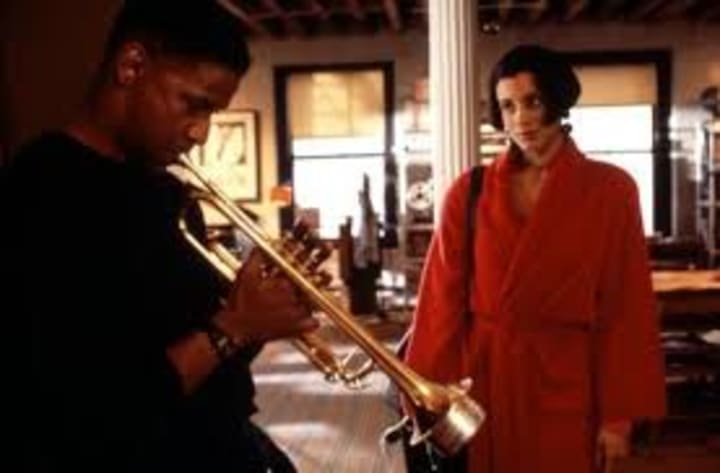
The character of Bleek is a fascinating one. Denzel Washington does a brilliant job of communicating Bleek’s inner turmoil. Music, it turns out, is not something that Bleek loves or even enjoys. Music is a penance for Bleek, it’s his burden. He carries this burden joylessly. He’s brilliant and he makes incredible music but he gets no pleasure from it. Watch the way he stands rail straight with the trumpet pushed so hard against his lips that it must hurt like hell.
He appears to be causing himself intense pain when he plays even as what he plays is gorgeous, silky and seductive. We are told he practices up to eight hours a day and Spike captures this visually as a fugue state in which Bleek goes so deeply inside his own mind he can’t see or feel anything of the world around him. All that Bleek hears is a beat and all that he sees are notes and his mind is wrapped up in how to bring these notes to life.
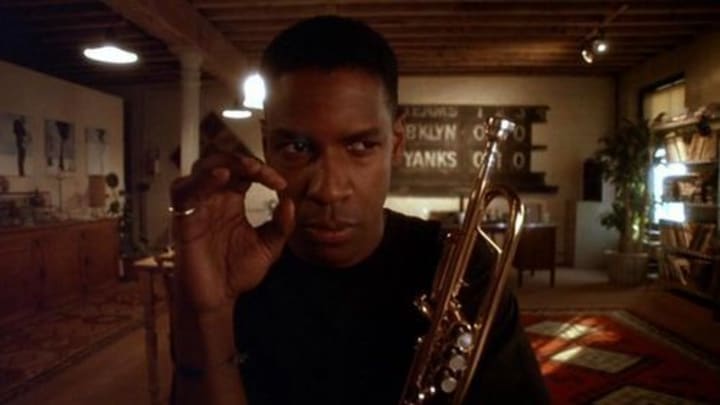
Now, you might argue that Bleek does enjoy music by pointing to the scene in which Bleek delivers a spoken word rant in a fashion that is lively and charismatic as anything Denzel Washington has performed. Indeed it is a remarkable moment, filled with fiery wit and ferocious jazz but look closer. The song is about hearing music on the radio that’s all the same, everything is a love song and Bleek is incensed at the sameness.
Here, Bleek launches into a lengthy musical diatribe about the trite ways in which modern music portrays love as all consuming and baby this and baby that. He’s not wrong but watch how he grows more and more disconnected, he doth protest too much. The song is long and Bleek’s manner is cynical to the point of inner rot. He’s so far down on the concept of love and music that his disdain is showing even amid the luscious sound of the song.
That disdain is what stuck with me and made the ending of Mo Better Blues land so well with me. Others have found the ending of Mo Better Blues less than fitting. What has Bleek done to deserve such a tidy and joyful end? What did he do to heal and earn the love and trust of this woman whom he ends up with? Fair questions, all, but I still bought in. This is what Bleek wanted all along but denied himself.
While he evinced a playboy detachment and dedication to craft, deep down he longed for stable domesticity. He’s eager for a life free of the agony of brilliance. Being a genius with an unending and deeply cultivated talent is exhausting. In the end, though I tend to loathe such paeans to traditional marriage and family, this feels appropriate to me. I find the ending of Mo Better Blues to be a lovely grace note, one I am glad Spike chose to go out on.
The gentility of the ending is lovely and it paints a beautiful portrait of suburban black life that so often movies are not capable of demonstrating without cliche. Spike upends the traditional values enforced by society by allowing a pair of black characters the kind of homey, beautiful, loving end that so often is reserved for white characters. Characters like Bleek are more often lent to tragic ends. Mo Better Blues, for me, is better for giving us something joyous to go home with.
About the Creator
Sean Patrick
Hello, my name is Sean Patrick He/Him, and I am a film critic and podcast host for the I Hate Critics Movie Review Podcast I am a voting member of the Critics Choice Association, the group behind the annual Critics Choice Awards.






Comments
There are no comments for this story
Be the first to respond and start the conversation.